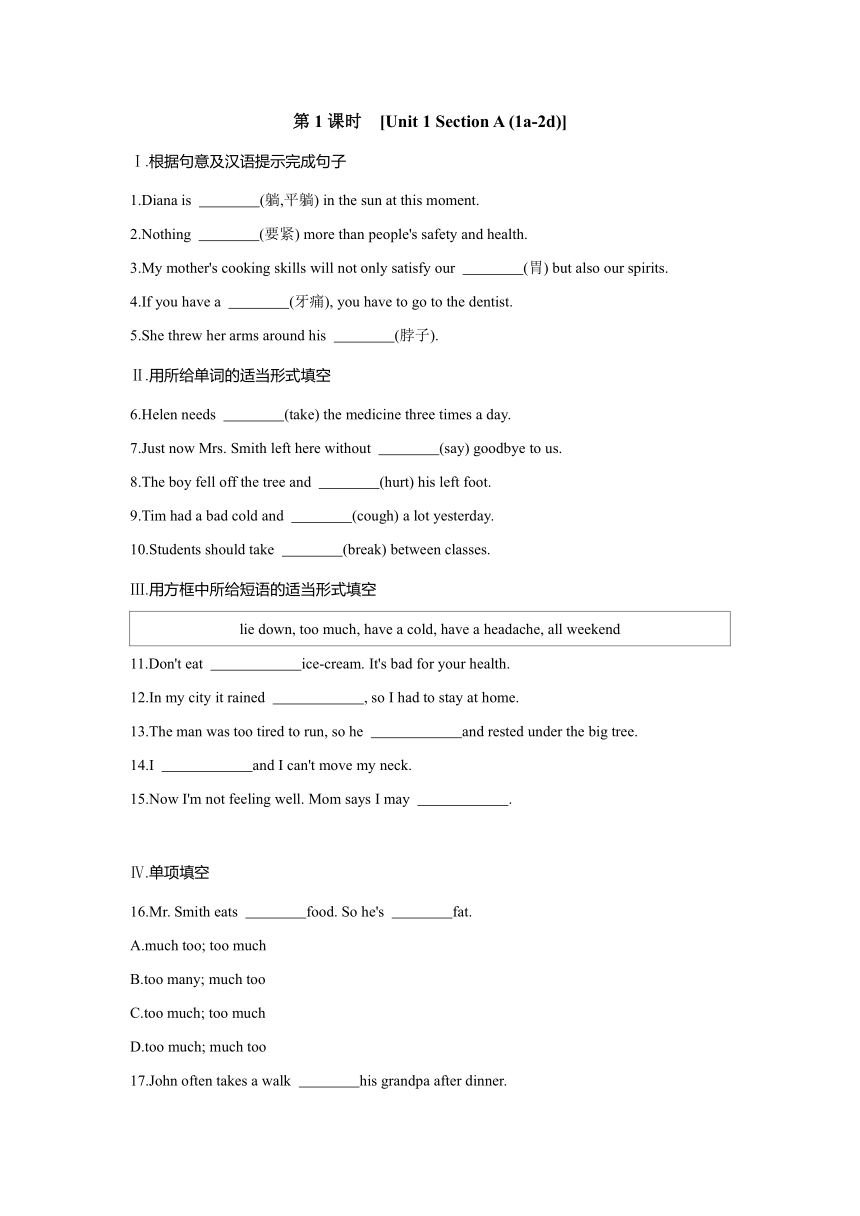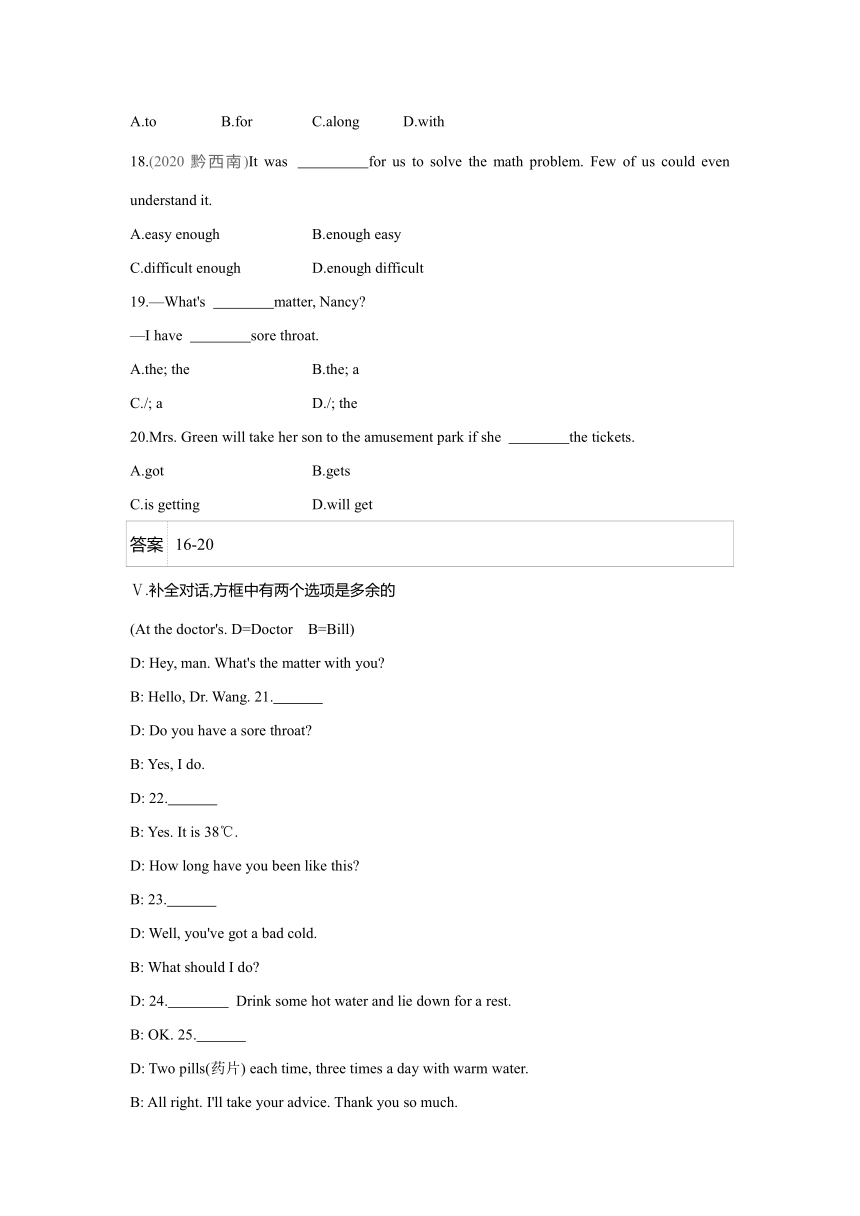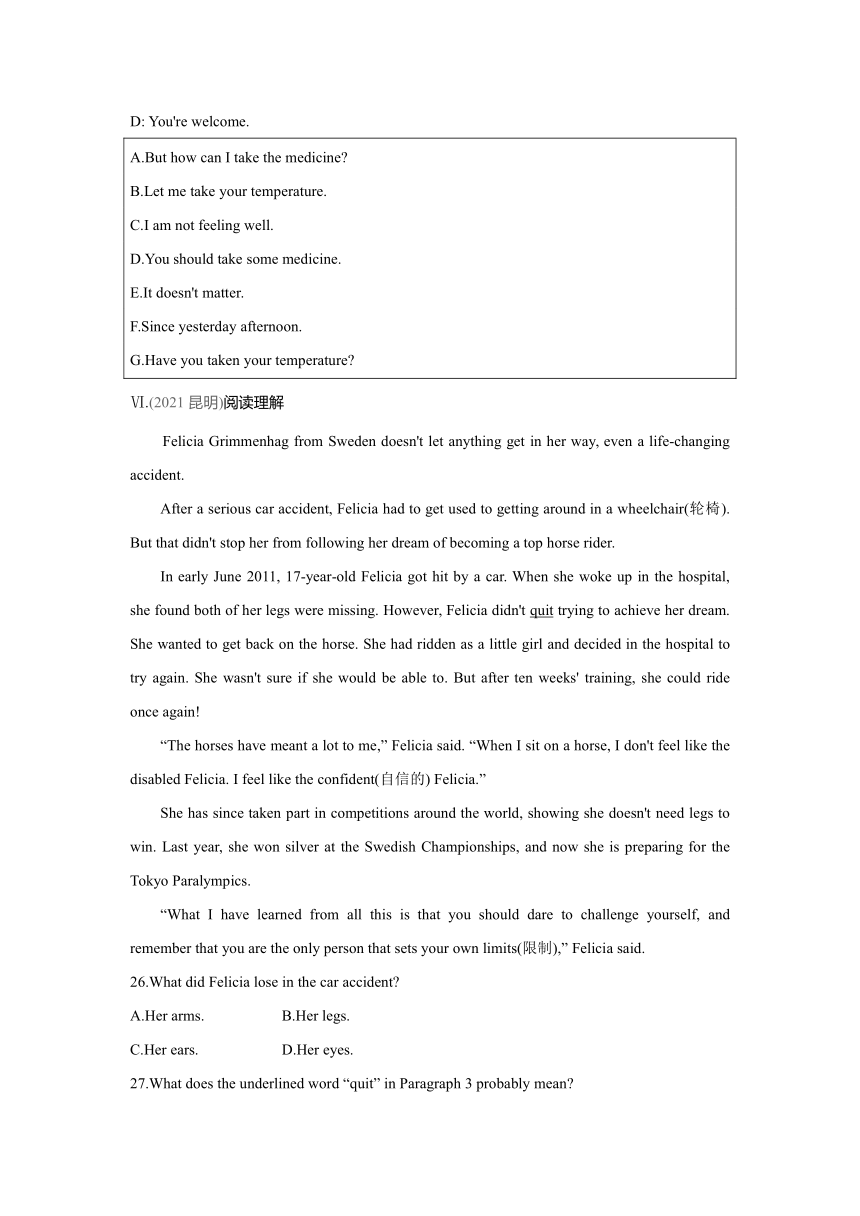Unit 1 What's the matter? Section A (1a-2d)(word版,含答案)
文档属性
| 名称 | Unit 1 What's the matter? Section A (1a-2d)(word版,含答案) |  | |
| 格式 | docx | ||
| 文件大小 | 46.9KB | ||
| 资源类型 | 教案 | ||
| 版本资源 | 人教新目标(Go for it)版 | ||
| 科目 | 英语 | ||
| 更新时间 | 2022-04-08 15:56:55 | ||
图片预览



文档简介
第1课时 [Unit 1 Section A (1a-2d)]
Ⅰ.根据句意及汉语提示完成句子
1.Diana is (躺,平躺) in the sun at this moment.
2.Nothing (要紧) more than people's safety and health.
3.My mother's cooking skills will not only satisfy our (胃) but also our spirits.
4.If you have a (牙痛), you have to go to the dentist.
5.She threw her arms around his (脖子).
Ⅱ.用所给单词的适当形式填空
6.Helen needs (take) the medicine three times a day.
7.Just now Mrs. Smith left here without (say) goodbye to us.
8.The boy fell off the tree and (hurt) his left foot.
9.Tim had a bad cold and (cough) a lot yesterday.
10.Students should take (break) between classes.
Ⅲ.用方框中所给短语的适当形式填空
lie down, too much, have a cold, have a headache, all weekend
11.Don't eat ice-cream. It's bad for your health.
12.In my city it rained , so I had to stay at home.
13.The man was too tired to run, so he and rested under the big tree.
14.I and I can't move my neck.
15.Now I'm not feeling well. Mom says I may .
Ⅳ.单项填空
16.Mr. Smith eats food. So he's fat.
A.much too; too much
B.too many; much too
C.too much; too much
D.too much; much too
17.John often takes a walk his grandpa after dinner.
A.to B.for C.along D.with
18.(2020黔西南)It was for us to solve the math problem. Few of us could even understand it.
A.easy enough B.enough easy
C.difficult enough D.enough difficult
19.—What's matter, Nancy
—I have sore throat.
A.the; the B.the; a
C./; a D./; the
20.Mrs. Green will take her son to the amusement park if she the tickets.
A.got B.gets
C.is getting D.will get
答案 16-20
Ⅴ.补全对话,方框中有两个选项是多余的
(At the doctor's. D=Doctor B=Bill)
D: Hey, man. What's the matter with you
B: Hello, Dr. Wang. 21.
D: Do you have a sore throat
B: Yes, I do.
D: 22.
B: Yes. It is 38℃.
D: How long have you been like this
B: 23.
D: Well, you've got a bad cold.
B: What should I do
D: 24. Drink some hot water and lie down for a rest.
B: OK. 25.
D: Two pills(药片) each time, three times a day with warm water.
B: All right. I'll take your advice. Thank you so much.
D: You're welcome.
A.But how can I take the medicine
B.Let me take your temperature.
C.I am not feeling well.
D.You should take some medicine.
E.It doesn't matter.
F.Since yesterday afternoon.
G.Have you taken your temperature
Ⅵ.(2021昆明)阅读理解
Felicia Grimmenhag from Sweden doesn't let anything get in her way, even a life-changing accident.
After a serious car accident, Felicia had to get used to getting around in a wheelchair(轮椅). But that didn't stop her from following her dream of becoming a top horse rider.
In early June 2011, 17-year-old Felicia got hit by a car. When she woke up in the hospital, she found both of her legs were missing. However, Felicia didn't quit trying to achieve her dream. She wanted to get back on the horse. She had ridden as a little girl and decided in the hospital to try again. She wasn't sure if she would be able to. But after ten weeks' training, she could ride once again!
“The horses have meant a lot to me,” Felicia said. “When I sit on a horse, I don't feel like the disabled Felicia. I feel like the confident(自信的) Felicia.”
She has since taken part in competitions around the world, showing she doesn't need legs to win. Last year, she won silver at the Swedish Championships, and now she is preparing for the Tokyo Paralympics.
“What I have learned from all this is that you should dare to challenge yourself, and remember that you are the only person that sets your own limits(限制),” Felicia said.
26.What did Felicia lose in the car accident
A.Her arms. B.Her legs.
C.Her ears. D.Her eyes.
27.What does the underlined word “quit” in Paragraph 3 probably mean
A.Keep. B.Enjoy. C.Begin. D.Stop.
28.How long did it take Felicia to train to ride a horse again
A.One year. B.Nine years.
C.Ten weeks. D.Seventeen weeks.
29.The horses have meant a lot to Felicia for reasons of the following EXCEPT .
A.becoming a top horse rider is her dream
B.she is filled with confidence when riding a horse
C.she can get around on a horse instead of in a wheelchair
D.she doesn't feel disabled anymore when sitting on a horse
30.Which of the following can best describe Felicia's experience
A.Never say never.
B.Better late than never.
C.Never think of yourself.
D.It's never too late to learn.
答案 26-30
答案
第1课时 [Unit 1 Section A (1a-2d)]
Ⅰ.1.lying 2.matters 3.stomachs 4.toothache 5.neck
Ⅱ.6.to take 7.saying 8.hurt 9.coughed 10.breaks
Ⅲ.11.too much 12.all weekend 13.lay down 14.have a headache
15.have a cold
Ⅳ.16.D too much 意为“太多”,修饰不可数名词;too many意为“太多”,修饰可数名词复数;much too 意为“太……”,修饰形容词或副词原级。
17.D 介词。句意:晚饭后, 约翰经常和爷爷去散步。由句意可知,所填介词表示“和……一起”,应用介词with。
18.C 句意: 对我们来说解那道数学题太难了。甚至我们当中几乎没有人能理解它。enough用作副词时,意为“足够,充分”,一般应放在所修饰的形容词、副词或动词的后面。根据后一句“Few of us could even understand it.”可知选C。
19.B 冠词的用法。What's the matter 意为“怎么了 ”,是固定句型;have a sore throat是固定短语,意为“嗓子疼”。根据句意可知选B。
20.B 根据语境可知,此处是if引导的条件状语从句,遵循“主将从现”的原则,主句为一般将来时态,从句应用一般现在时态。B。
Ⅴ.21—25 CGFDA
Ⅵ.[主旨大意] 本文是一篇记叙文。文章主要记叙了瑞典女孩费利西亚的故事。她因意外失去双腿,但并未失去信心,她通过积极训练又重拾梦想。费利西亚向人们展示了永不言败的精神。
26.B 细节理解题。根据文章第三段中的“When she woke up in the hospital, she found both of her legs were missing.”可知,费利西亚失去的是双腿,B。
27.D 词义猜测题。由下文的描述可知,费利西亚虽然失去了双腿,但她并未停止追寻自己的梦想,画线词quit意为“停止”,D。
28.C 细节理解题。根据文章第三段最后一句“But after ten weeks' training, she could ride once again!”可知,经过十周的训练,费利西亚又可以骑马了,C。
29.C 推理判断题。根据文章第二段最后一句“But that didn't stop her from following her dream of becoming a top horse rider.”可知A项正确;根据文章第四段中的“When I sit on a horse, I don't feel like the disabled Felicia. I feel like the confident Felicia.”可知B、D两项正确。C项在原文中找不到相应的信息,故C项错误,C。
30.A 主旨大意题。根据文章最后一段费利西亚说的话“你应该敢于挑战自己,并且记住: 你是唯一可以设定自己极限的人”可知,这篇文章想传递给我们的是“Never say never(永不言败).”的精神。A。
Ⅰ.根据句意及汉语提示完成句子
1.Diana is (躺,平躺) in the sun at this moment.
2.Nothing (要紧) more than people's safety and health.
3.My mother's cooking skills will not only satisfy our (胃) but also our spirits.
4.If you have a (牙痛), you have to go to the dentist.
5.She threw her arms around his (脖子).
Ⅱ.用所给单词的适当形式填空
6.Helen needs (take) the medicine three times a day.
7.Just now Mrs. Smith left here without (say) goodbye to us.
8.The boy fell off the tree and (hurt) his left foot.
9.Tim had a bad cold and (cough) a lot yesterday.
10.Students should take (break) between classes.
Ⅲ.用方框中所给短语的适当形式填空
lie down, too much, have a cold, have a headache, all weekend
11.Don't eat ice-cream. It's bad for your health.
12.In my city it rained , so I had to stay at home.
13.The man was too tired to run, so he and rested under the big tree.
14.I and I can't move my neck.
15.Now I'm not feeling well. Mom says I may .
Ⅳ.单项填空
16.Mr. Smith eats food. So he's fat.
A.much too; too much
B.too many; much too
C.too much; too much
D.too much; much too
17.John often takes a walk his grandpa after dinner.
A.to B.for C.along D.with
18.(2020黔西南)It was for us to solve the math problem. Few of us could even understand it.
A.easy enough B.enough easy
C.difficult enough D.enough difficult
19.—What's matter, Nancy
—I have sore throat.
A.the; the B.the; a
C./; a D./; the
20.Mrs. Green will take her son to the amusement park if she the tickets.
A.got B.gets
C.is getting D.will get
答案 16-20
Ⅴ.补全对话,方框中有两个选项是多余的
(At the doctor's. D=Doctor B=Bill)
D: Hey, man. What's the matter with you
B: Hello, Dr. Wang. 21.
D: Do you have a sore throat
B: Yes, I do.
D: 22.
B: Yes. It is 38℃.
D: How long have you been like this
B: 23.
D: Well, you've got a bad cold.
B: What should I do
D: 24. Drink some hot water and lie down for a rest.
B: OK. 25.
D: Two pills(药片) each time, three times a day with warm water.
B: All right. I'll take your advice. Thank you so much.
D: You're welcome.
A.But how can I take the medicine
B.Let me take your temperature.
C.I am not feeling well.
D.You should take some medicine.
E.It doesn't matter.
F.Since yesterday afternoon.
G.Have you taken your temperature
Ⅵ.(2021昆明)阅读理解
Felicia Grimmenhag from Sweden doesn't let anything get in her way, even a life-changing accident.
After a serious car accident, Felicia had to get used to getting around in a wheelchair(轮椅). But that didn't stop her from following her dream of becoming a top horse rider.
In early June 2011, 17-year-old Felicia got hit by a car. When she woke up in the hospital, she found both of her legs were missing. However, Felicia didn't quit trying to achieve her dream. She wanted to get back on the horse. She had ridden as a little girl and decided in the hospital to try again. She wasn't sure if she would be able to. But after ten weeks' training, she could ride once again!
“The horses have meant a lot to me,” Felicia said. “When I sit on a horse, I don't feel like the disabled Felicia. I feel like the confident(自信的) Felicia.”
She has since taken part in competitions around the world, showing she doesn't need legs to win. Last year, she won silver at the Swedish Championships, and now she is preparing for the Tokyo Paralympics.
“What I have learned from all this is that you should dare to challenge yourself, and remember that you are the only person that sets your own limits(限制),” Felicia said.
26.What did Felicia lose in the car accident
A.Her arms. B.Her legs.
C.Her ears. D.Her eyes.
27.What does the underlined word “quit” in Paragraph 3 probably mean
A.Keep. B.Enjoy. C.Begin. D.Stop.
28.How long did it take Felicia to train to ride a horse again
A.One year. B.Nine years.
C.Ten weeks. D.Seventeen weeks.
29.The horses have meant a lot to Felicia for reasons of the following EXCEPT .
A.becoming a top horse rider is her dream
B.she is filled with confidence when riding a horse
C.she can get around on a horse instead of in a wheelchair
D.she doesn't feel disabled anymore when sitting on a horse
30.Which of the following can best describe Felicia's experience
A.Never say never.
B.Better late than never.
C.Never think of yourself.
D.It's never too late to learn.
答案 26-30
答案
第1课时 [Unit 1 Section A (1a-2d)]
Ⅰ.1.lying 2.matters 3.stomachs 4.toothache 5.neck
Ⅱ.6.to take 7.saying 8.hurt 9.coughed 10.breaks
Ⅲ.11.too much 12.all weekend 13.lay down 14.have a headache
15.have a cold
Ⅳ.16.D too much 意为“太多”,修饰不可数名词;too many意为“太多”,修饰可数名词复数;much too 意为“太……”,修饰形容词或副词原级。
17.D 介词。句意:晚饭后, 约翰经常和爷爷去散步。由句意可知,所填介词表示“和……一起”,应用介词with。
18.C 句意: 对我们来说解那道数学题太难了。甚至我们当中几乎没有人能理解它。enough用作副词时,意为“足够,充分”,一般应放在所修饰的形容词、副词或动词的后面。根据后一句“Few of us could even understand it.”可知选C。
19.B 冠词的用法。What's the matter 意为“怎么了 ”,是固定句型;have a sore throat是固定短语,意为“嗓子疼”。根据句意可知选B。
20.B 根据语境可知,此处是if引导的条件状语从句,遵循“主将从现”的原则,主句为一般将来时态,从句应用一般现在时态。B。
Ⅴ.21—25 CGFDA
Ⅵ.[主旨大意] 本文是一篇记叙文。文章主要记叙了瑞典女孩费利西亚的故事。她因意外失去双腿,但并未失去信心,她通过积极训练又重拾梦想。费利西亚向人们展示了永不言败的精神。
26.B 细节理解题。根据文章第三段中的“When she woke up in the hospital, she found both of her legs were missing.”可知,费利西亚失去的是双腿,B。
27.D 词义猜测题。由下文的描述可知,费利西亚虽然失去了双腿,但她并未停止追寻自己的梦想,画线词quit意为“停止”,D。
28.C 细节理解题。根据文章第三段最后一句“But after ten weeks' training, she could ride once again!”可知,经过十周的训练,费利西亚又可以骑马了,C。
29.C 推理判断题。根据文章第二段最后一句“But that didn't stop her from following her dream of becoming a top horse rider.”可知A项正确;根据文章第四段中的“When I sit on a horse, I don't feel like the disabled Felicia. I feel like the confident Felicia.”可知B、D两项正确。C项在原文中找不到相应的信息,故C项错误,C。
30.A 主旨大意题。根据文章最后一段费利西亚说的话“你应该敢于挑战自己,并且记住: 你是唯一可以设定自己极限的人”可知,这篇文章想传递给我们的是“Never say never(永不言败).”的精神。A。
同课章节目录
- Unit 1 What's the matter?
- Section A
- Section B
- Unit 2 I'll help to clean up the city parks.
- Section A
- Section B
- Unit 3 Could you please clean your room?
- Section A
- Section B
- Unit 4 Why don't you talk to your parents?
- Section A
- Section B
- Unit 5 What were you doing when the rainstorm came
- Section A
- Section B
- Review of Units 1-5
- Unit 6 An old man tried to move the mountains.
- Section A
- Section B
- Unit 7 What's the highest mountain in the world?
- Section A
- Section B
- Unit 8 Have you read Treasure Island yet?
- Section A
- Section B
- Unit 9 Have you ever been to a museum?
- Section A
- Section B
- Unit 10 I've had this bike for three years.
- Section A
- Section B
